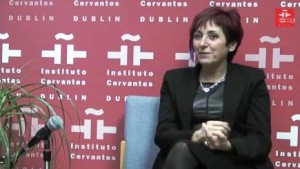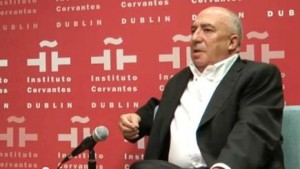Blog del Instituto Cervantes de Dublín
Torre Martello
Proyección | Film Screening: Neruda, el Hombre y su Obra
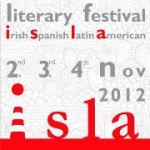 Para terminar el segundo día del Festival de Literatura ISLA os ofrecemos un interesante cortometraje de Neruda. Te esperamos el próximo día 3 de Noviembre a las 18:00 en el Café Literario.
Para terminar el segundo día del Festival de Literatura ISLA os ofrecemos un interesante cortometraje de Neruda. Te esperamos el próximo día 3 de Noviembre a las 18:00 en el Café Literario.
Este documental rescata la memoria, pero también la vigencia de obra y pensamiento de Pablo Neruda, uno de los personajes mas universales de la cultura chilena, y es la primera y única hasta ahora que abarca completamente la vida y obra de este fundamento de la identidad chilena. La cámara recorre Chile y los diversos países del mundo donde Neruda llevó su arte y, con ello la voz de Chile y de lo más genuino de su gente. Además de profundizar en los valores artísticos, el documental aborda aspectos inéditos de Neruda como creador, pensador, amante, luchador social y embajador cultural, lo que convierte este audiovisual en un valioso documento contemporáneo no solo para los chilenos, sino también como un importante patrimonio en el archivo que la cultura mundial debe tener sobre Chile.
To finish the second day of ISLA Literary Festival we offer an interesting short of Neruda. We hope to see you the next November 3rd at 18:00 hrs in Café Literario.
This documentay recovers the memory, but also the validity of Pablo Neruda’s work and thought, one of the most universal characters of Chilean culture, and it is the first and so far only one to include completely the life and work of this foundation of Chilean identity. The camera travels around Chile and the various countries of the world where Neruda took his art, and with it the voice of Chile and of the most genuine of its people. In addition to studying in depth the artistic values, the documentary approaches some of Neruda’s unknown apects as a creator, thinker, lover, social fighter and cultural ambassador, which makes this film a valuable contemporary document not only for the Chilean, but also as an important heritage to the archive that world culture must have about Chile.
[Video] Elia Barceló en el Festival Isla de Literatura
Elia Barceló participó en la mesa redonda «Literatura fantástica y poesía: de Cortázar a Beckett, pasando por Borges», con la que abrimos el festival ISLA de literatura el pasado mes de noviembre. En este video es entrevistada por Carmen Sanjulián. Edición de Cris Méndez.
Elia Barceló (Alicante, España, 1957) ha publicado novelas policíacas, históricas, de ciencia ficción y género fantástico para adultos, así como novelas para jóvenes y ensayos. Ha recibido el Premio Gabriel 2007, galardón reservado para las más importantes personalidades del género fantástico en España.
Elia Barceló ha sido traducida al francés, italiano, alemán, catalán, inglés, griego, húngaro, holandés, danés, noruego, sueco, croata, portugués, euskera, checo, ruso y esperanto.
Sus novelas traducidas al inglés hasta la fecha son: Corazón de tango (2007), traducida al inglés como Heart of Tango (2010) y The Goldsmith’s Secret (2011), traducción de El secreto del orfebre (2003).
The ISLA Literary Festival kicked off with this round table where guests Elia Barceló, Harry Clifton and Bernardo Toro discussed poetry and fantastic literature, its influences and much more with Jean-Philippe Imbert (DCU).
Elia Barceló (Alicante, Spain, 1957) has published crime, historical, science fiction and fantastic novels for adults, as well as young adult books and essays. In 2007 she received the Gabriel Award, a prize for the most important personalities in the fantastic genre in Spain.
Her work has been translated into French, Italian, German, Catalan, English, Greek, Hungarian, Dutch, Danish, Norwegian, Swedish, Croatian, Portuguese, Basque, Czech, Russian and Esperanto.
Her novels translated into English are: Corazón de tango (2007), translated into English under the name Heart of Tango (2010) and The Goldsmith’s Secret (2011), a translation of El secreto del orfebre (2003).
Entrevista con Elia Barceló
Elia Barceló: La literatura es más grande que la vida
Entrevista con Elia Barceló realizada el 2 de noviembre de 2012 en la Biblioteca Dámaso Alonso del Instituto Cervantes de Dublín con motivo de su participación en la mesa redonda “Literatura fantástica y poesía: de Cortázar a Beckett, pasando por Borges”, junto a Harry Clifton y Bernardo Toro, dentro del Festival Isla de literatura 2012.
Elia Barceló (Alicante, España, 1957) ha publicado novelas policiacas, históricas, de ciencia ficción y de género fantástico para adultos, así como novelas para jóvenes y ensayos. En 2007 recibió el Premio Gabriel 2007, galardón reservado para las más importantes personalidades del género fantástico en España. Su obra ha sido traducida al francés, italiano, alemán, catalán, inglés, griego, húngaro, holandés, danés, noruego, sueco, croata, portugués, vasco, checo, ruso y esperanto. Sus novelas traducidas al inglés hasta la fecha son Corazón de tango (2007) (Heart of Tango, 2010) y El secreto del orfebre (2003) (The Goldsmith’s Secret, 2011). En 2013 se publicaron los dos primeros volúmenes de su trilogía Anima mundi.
Carmen Sanjulián: —Elia, los entendidos dicen que eres maestra de las palabras. Escribiste El almacén de las palabras terribles y yo creo que dejaste las palabras terribles en ese almacén y tú te quedaste con las palabras hermosas.
Elia Barceló: —Esa es una de mis ideas. Para mí, seguramente porque vivo en el extranjero, la lengua, mi lengua, es una cosa fundamental. Para mí las palabras son un auténtico tesoro. No es hablar por hablar, es algo que mimo y aprecio.
Carmen Sanjulián: —En tus novelas siempre intentas romper muchos estereotipos: sobre los roles sexuales, sobre la identidad… Serías una buena política.
Elia Barceló: —Jamás, nunca. Yo quizás podría ser una buena amiga de un político, por ejemplo, para poderle decir las barbaridades que están haciendo. Pero yo misma no sería capaz. Yo soy partidaria de pequeños grupos que funcionen autónomamente. Si yo pensara que el anarquismo funciona en realidad, yo sería absolutamente anarquista.
Carmen Sanjulián: —La ciencia ficción, que cada vez tiene más seguidores, todavía se considera como la hermana pobre de la literatura. ¿A qué es debido?
Elia Barceló: —A mil cosas. Supongo que muchísima gente habla mal de la ciencia ficción sin haber leído nunca ciencia ficción. Han visto un par de películas en la tele. Con un poco de mala suerte, han visto lo peor que la ciencia ficción tiene que ofrecer. Y entonces piensan que son memeces para descerebrados y cosas así.
He escrito 19 libros y solo tres de ellos son de ciencia ficción, pero creo que la ciencia ficción es de los pocos géneros literarios que ofrece temas nuevos. Todos los demás géneros tratan básicamente sobre lo mismo que trataba la literatura hace dos mil años. La ciencia ficción es la única que abre nuevos caminos. Y seguramente, para muchos lectores eso es algo que asusta. Porque hace falta trabajar más. Cuando entras en una novela de ciencia ficción, no la entiendes de golpe. Tienes que poner mucho de tu parte.
Carmen Sanjulián: —Hay una simbiosis entre el mundo de la ciencia y los escritores de ciencia ficción.
Elia Barceló: —Sí, a mí me llamaba mucho la atención cuando yo era jovencita y leíamos cosas que ya trataba la ficción, por ejemplo temas como la clonación de niños. Este tipo de problemas que ahora ya son reales. En aquella época, daba la sensación de que eran locuras y tonterías que se inventaban unos cuantos. Y yo pienso que es importante que nos vayamos planteando cierto tipo de cosas que van a venir. La literatura hace entre otras cosas que uno vea el mundo de otra manera, con otros ojos. Y por eso la ciencia ficción es un gran desafío. Hay muchos géneros que también lo son.
Carmen Sanjulián: —¿Qué son, si no ciencia ficción, los recuerdos que tenemos?
Elia Barceló: —Los seres humanos somos narradores, eso es básico. Todo ser humano necesita narrar. Y uno se narra a sí mismo su propia historia. Hay cosas en las que uno sabe que se está mintiendo a sí mismo, porque siente vergüenza, porque no le parece presentable. Otras veces, cuando ya has contado algo cuatro o cinco veces, ya no eres consciente de que estás mintiendo. Tienes clarísimo que fue así. Por eso escribí una novela que se llama Disfraces terribles, que trata justamente de eso, de alguien que trata de hacer una biografía de un gran autor argentino y tiene la idea de que preguntándole a la gente que lo conoció y leyendo sus textos podrá recrearlo. Pero se va dando cuenta de que el recuerdo es una creación.
Carmen Sanjulián: —Si los habitantes de Umbría vieran el panorama que tenemos hoy, no solamente en Europa sino especialmente en España, ¿qué dirían?, ¿cómo actuarían?
Elia Barceló: —Los pobres habitantes de Umbría están habituados a todo, porque Umbría es una región autonómica española creada por cuatro escritores hace unos diez años en la que todo es posible. La gracia de Umbría es que allí todo es normal. Hay carreteras normales y aeropuertos y restaurantes, pero todos sus habitantes saben que allí pasan cosas raras y de eso no se habla. Se sabe, pero no se habla. Se mirarían y dirían que así son las cosas.
Carmen Sanjulián: —Hasta ahora has situado todas tus novelas en Umbría. ¿Estás escribiendo alguna otra situada en ese mundo de ficción?
Elia Barceló: —No. En este momento no. Éramos cuatro autores y el único que continuó escribiendo, además de mí misma, fue César Mallorquí. Los otros lo dejaron, por eso todavía no tengo claro si de verdad vale la pena que continuemos montando ese mundo. Ahora, la novela que estoy escribiendo pasa en este planeta, pero en todas partes. Tengo veinticinco localizaciones o algo así.
Carmen Sanjulián: —Como la ciencia ficción es un género que no es bien conocido, algunos lo han aprovechado a veces para robar ideas. ¿A ti te ha pasado alguna vez con alguno de tus libros?
Elia Barceló: —Yo me figuro que es confluencia. Nunca pienso que me roban ideas. Creo que la literatura, en la base, es como una especie de cajón del tesoro de los piratas donde, cuando tú abres la tapa, hay tantas cosas bonitas y tienes la sensación de que no son de nadie en concreto, son de todos. Y empiezas a ponerte collares, pendientes, cosas y no te das cuenta de que a lo mejor pertenecía a otra persona. Yo no creo que nos roben ideas, no hace falta.
Carmen Sanjulián: —A ti te gusta visitar los lugares en los que se sitúan tus novelas y experimentar. ¡Alguna vez incluso has perseguido a alguien para ver lo que se siente!
Elia Barceló: —Sí… Generalmente todo va muy bien, no pasa nada. Pero en el primer momento, cuando alguien te dice «¿por qué me mira usted tanto?» Entonces le dices: «mire, lo encuentro a usted muy interesante, porque estoy escribiendo una novela y tengo un personaje como usted». Entonces ya se ponen muy simpáticos y muy agradables.
Carmen Sanjulián: —Una de tus últimas experiencias ha sido el tango. Sitúas Corazón de tango en ese mundo fascinante de los años 20. Tu visita ahora a Buenos Aires, ¿ejerció en ti la misma fascinación?
Elia Barceló: —Una de las gracias de la literatura en general es que es más grande que la vida. Cuando uno describe algo literariamente en una historia, le toca más, le llega más. Ves unas imágenes que son mucho más potentes que las que luego tiene cuando estás allí. De hecho, yo empecé a escribir Corazón de tango básicamente cuando dejé de bailar. El tango es un baile donde es el hombre quien manda, quien te lleva, quien decide, quien lo hace todo. Y mi marido dijo «mira chica, yo ya empiezo a cansarme mucho de esto del tango». Seguramente porque entendía las letras y me me decía «es que es insoportable estar cuatro o cinco horas oyendo cómo se queja alguien porque lo han abandonado». Como ya no bailábamos, empecé a escribir.
Carmen Sanjulián: —Lo que está clarísimo es que eres una mujer tremendamente curiosa, que experimenta y escarba en muchos campos.
Elia Barceló: —Sí. Una cosa muy típica de mí es que cada novela que hago es otra cosa. Tanto mis editores como mi agente me dicen «podrías coger una línea y que tus lectores ya supieran lo que hay que esperar». He hecho novela histórica, criminal, fantástica, de terror, realista, de todo. Lo que estoy haciendo ahora no tiene todavía una etiqueta concreta. Es una especie de thriller. Es una trilogía, es grandísimo, van a ser mil trescientas páginas o así. Es un thriller actual, que sucede en este mundo, donde hay unos cuantos elementos fantásticos que cada vez son más fuertes y más potentes, y un final inesperado o sorprendente. Al menos eso espero. Y espero que os guste y que lo leáis, se llama Anima Mundi.
Enlaces Recomendados
- [Vídeo] Entrevista realizada a Elia Barceló en el Instituto Cervantes de Dublín por Carmen Sanjulián.
- Elia Barceló en Conocer al autor.com.
- Entrevista a Elia Barceló en el diario ABC.es sobre la publicación de Anima mundi.
< Listado de Entrevistas
[Video] Harry Clifton en el Festival Isla de Literatura / Isla Literary Festival
Harry Clifton participó en la mesa redonda «Literatura fantástica y poesía: de Cortázar a Beckett, pasando por Borges», con la que abrimos el festival ISLA de literatura el pasado mes de noviembre. En este video es entrevistado por Megan Specia. Edición de Cris Méndez.
Harry Clifton (Dublín, 1952) ha vivido una parte importante de su vida fuera de Irlanda (Nigeria, Extremo Oriente, Italia…). De su estancia en Italia publicó sus memorias en prosa On the Spine of Italy.
En 2004 regresó a Irlanda. Entre sus colecciones de poemas se encuentran The Desert Route: Selected Poems 1973-1988 y Secular Eden: Paris Notebooks 1994-2004. También es autor de una colección de ficción, Berkeley’s Telephone and Other Fictions (2000). Clifton fue nombrado Ireland Chair of Poetry en 2010. Ha recibido también el premio de poesía Patrick Kavanagh y dos premios Arts Council Bursaries de literatura. Sus obras han sido traducidas a varias lenguas europeas.
The ISLA Literary Festival kicked off with this round table where guests Elia Barceló, Harry Clifton and Bernardo Toro discussed poetry and fantastic literature, its influences and much more with Jean-Philippe Imbert (DCU).
Harry Clifton (Dublin, 1952) has spent great part of his life outside of Ireland (Nigeria, Far East, Italy…). He documented the time spent in Italy in his prose memoir On the Spine of Italy.
In 2004, he returned to Ireland. His collections of poems include The Desert Route: Selected Poems 1973-1988 and Secular Eden: Paris Notebooks 1994-2004. He is also the author of a collection of fiction, Berkeley’s Telephone and Other Fictions (2000). He was appointed as the Ireland Chair of Poetry in 2010. His other honors include the Patrick Kavanagh Poetry Award and two Arts Council Bursaries in Literature. His work has been translated into several European languages.
Mesa redonda: Conflictos: ficción, humor y sociedad | Round table discussion: Conflicts: fiction, humour and society
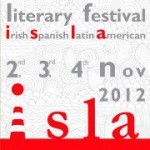 Como todos sabéis, hoy estrenamos festival, el Festival ISLA de Literatura, a las cuatro de la tarde, que será inaugurado oficialmente, a las 6:30, por el presidente de Irlanda, Sr. Michael D. Higgins.
Como todos sabéis, hoy estrenamos festival, el Festival ISLA de Literatura, a las cuatro de la tarde, que será inaugurado oficialmente, a las 6:30, por el presidente de Irlanda, Sr. Michael D. Higgins.
Mañana sábado, día 3 de noviembre, comenzaremos a las 11:30 con la mesa redonda que lleva por título «Escritores sin escrúpulos: intimidad, violencia y humor en la literatura», y continuaremos con «Cruzando fronteras: Poesía en la maleta». A las 3:30 compartiremos lecturas con varios de nuestros autores y a las 4:30 daremos paso a la mesa redonda «Conflictos: ficción, humor y sociedad», que contará con la participación de Lorenzo Silva, Bernardo Toro y Declan Bruke. Moderará la mesa Kate Quinn, de la Universidad Nacional de Irlanda en Galway.
Lorenzo Silva (Madrid, España, 1966), galardonado con el Premio Planeta hace apenas dos semanas, ha escrito, entre otras, las novelas La flaqueza del bolchevique (finalista del Premio Nadal 1997) que ha sido llevada al cine por Manuel Martín Cuenca, y Carta blanca (Premio Primavera 2004). Ha publicado también libros infantiles y juveniles, además de ensayos. Es especialmente conocido por la serie policíaca protagonizada por los investigadores Bevilacqua y Chamorro, iniciada con El lejano país de los estanques (Premio Ojo Crítico 1998), y a la que siguió, entre otras, El alquimista impaciente (Premio Nadal 2000), adaptada al cine por Patricia Ferreira. Su último libro publicado es Niños Feroces (2011). Su obra ha sido traducida a numerosos idiomas.
Bernardo Toro (Santiago, Chile) es un escritor radicado en Francia. En 1983 salió de Chile para continuar sus estudios en París, donde realizó un máster sobre la obra de Marcel Proust en la Universidad de La Sorbona. Entre 1988 y 1993, dirigió la revista de arte Lugares Extremos. Desde 1999 dirige la revista Rue Saint Ambroise, publicación dedicada al cuento contemporáneo. Actualmente es profesor y traductor literario. Es autor de dos novelas: Contretemps (A Contratiempo) (Les petits matins, 2006) y De fils à fils (De hijo a hijo) (Sotck, 2010). Su próxima novela, Qui d’autre à part nous, se publicará en el 2013.
Declan Burke ha publicado cuatro novelas hasta el día de hoy: Eightball Boogie (2003), The Big O (2007), Absolute Zero Cool (2011) y Slaughter’s Hound (2102). Absolute Zero Cool fue una de las finalistas en la categoría de novela negra para el premio Irish Book 2011 y recibió el premio Goldsboro Last Laugh a la mejor novela negra humorística en 2012. Es además el editor de These Green Streets: Irish Crime Writing in the 21st Century (2011) y co-editor, junto a John Connolly, de Books to Die For( 2012). Tiene una página web dedicada a la novela negra irlandesa llamada Crime Always Pays.
Cerraremos el día con la proyección del documental Neruda, el hombre y su obra.
We invite you to participate in a the round-table “Conflicts: fiction, humour and society” as part of the ISLA Festival. The event will be held the 3rd of November at 16:30 at Café Literario.
Historical memory, national or international conflicts and crime and daily life will be topics at this table thanks to literary works by guests Lorenzo Silva, Bernardo Toro and Declan Burke. Chaired by Kate Quinn (NUI Galway).
Lorenzo Silva (Madrid, Spain, 1966) is author of novels such as La Flaqueza del Bolchevique which was short listed for the Nadal Award in 1997, and was adapted for cinema by Manuel Martín Cuenca, andCarta Blanca which won the Primavera Award in 2004. He has also published books for children and young adults, as well as essays. He is especially known for the crime series starring detectives Bevilacqua and Chamorro, the series started with El lejano país de los estanques winner of the Ojo Crítico Award in 1998, and was followed by El Alquimista Impaciente winner of the Nadal Award in 2000, the later being adapted to cinema by Patricia Ferreira. His latest book Niños Feroces was published in 2011. His books have been translated into numerous languages such as Russian, French, German, Italian and Greek.
Bernardo Toro (Santiago, Chile) lives in France. He left Chile in 1983 to complete a masters degree at the Sorbonne University of Paris with a dissertation about Marcel Proust´s work. From 1988 to 1993 he was editor in chief of the art magazine Lugares Extremos. Since 1999, while working as lecturer and literary translator, he has been editor in chief of the magazine Rue Saint Ambroise, a publication dedicated to contemporary short stories. He is the author of two novels: Contretemps (2006) and De fils à fils (2010). His next novel, Qui d’autre à part nousis due for release in 2013.
Declan Burke has published four novels to date:Eightball Boogie (2003), The Big O (2007), Absolute Zero Cool (2011) and Slaughter’s Hound (2102).Absolute Zero Cool was shortlisted in the crime fiction section for the Irish Book Awards 2011, and received the Goldsboro Last Laugh Award for Best Humorous Crime Novel in 2012. He also is the editor of Down These Green Streets: Irish Crime Writing in the 21st Century (2011), and the co-editor, with John Connolly, of Books to Die For (2012). He hosts a website dedicated to Irish crime fiction called Crime Always Pays.
Audiolibro de la semana | Audiobook of the Week: Esta noche moriré
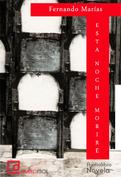 Con un inicio tan enigmático como “me suicidé hace dieciséis años”, Fernando Marías escribe una inquietante novela que te atrapará desde el primer momento. ¿Quieres escucharla en forma de audiolibro? Coge tu carnet de la biblioteca y haz click aquí.
Con un inicio tan enigmático como “me suicidé hace dieciséis años”, Fernando Marías escribe una inquietante novela que te atrapará desde el primer momento. ¿Quieres escucharla en forma de audiolibro? Coge tu carnet de la biblioteca y haz click aquí.
Delmar, un policía obsesionado en detener a un importante delincuente, se encuentra, 16 años más tarde de que consiga meterlo entre rejas, con que éste ha urdido un estratégico y macabro plan para vengarse. Aunque Delmar no es capaz, siquiera, de imaginar lo que le espera cuando recibe una larguísima carta. La estratagema del delincuente consiste en conseguir que acabe suicidándose, mostrándole hasta qué punto ha sido capaz de manipular su vida desde hace ya unos cuantos años.
This novel has an enigmatic beginning : “I committed suicide sixteen years ago”. Fernando Marías writes a disturbing novel that will hook you from the very first moment. Do you want to listen to it as an audiobook? Take your library card and make click here.
Delmar, a police man obsessed with arresting an important criminal, finds outs that he has created a strategic and macabre plan for revenge 16 years after putting him in jail. Delmar cannot imagine though what is coming when he receives a very long letter. The stratagem of the delinquent consists of making him commit suicide, showing him how he has been manipulating his life for quite a long time.
Elia Barceló, nuestra autora del mes en el Festival ISLA / Elia Barceló, our author of the month
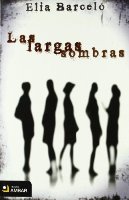 Elia Barceló (Alicante, 1957) estará con nosotros en el Festival ISLA de Literatura los días 2 y 3 de noviembre. Por eso, y para que conozcas un poco mejor su obra, la hemos seleccionado como autora del mes de noviembre en nuestra biblioteca.
Elia Barceló (Alicante, 1957) estará con nosotros en el Festival ISLA de Literatura los días 2 y 3 de noviembre. Por eso, y para que conozcas un poco mejor su obra, la hemos seleccionado como autora del mes de noviembre en nuestra biblioteca.
Elia Barceló reside en Austria desde 1981 donde es profesora de literatura hispánica.
Su campo de investigación es la literatura fantástica, de ciencia ficción y de terror, así como la narrativa argentina y cubana del siglo XX, la novela negra y la literatura juvenil en España. Se la considera una de las escritoras más importantes, en lengua castellana, del género de la ciencia-ficción, junto con la argentina Angélica Gorodischer y la cubana Daína Chaviano. Las tres forman la llamada “trinidad femenina de la ciencia-ficción en Hispanoamérica”.
Ha publicado novelas, ensayo y unos cuarenta relatos. Parte de su obra ha sido traducida al francés, italiano, alemán, catalán, inglés, griego, húngaro, holandés, danés, noruego, sueco y esperanto.
Elia Barceló (Alicante, 1957) is our author of the month in November. She will be with us in the ISLA Literary Festival the 2nd and the 3rd of November, so you have a good chance to know better her literary works.
She lives in Austria since 1981 where she teaches Spanish Literature. Her field of activity is Fantastic Literature, Science Fiction and Horror. She´s also interested in the Argentinian and Cuban narrative of the XX century, crime fiction and books for children and young adults.
She has published novels, essays and over forty short-stories. Part of her work has been translated into French, Italian, German, Catalan, English, Greek, Hungarian, Dutch, Danish, Norgewian and Esperanto.
Hoy leemos con | Today we are reading with: Elia Barceló, Kevin Barry, Christopher Domínguez Michael, Keith Ridgway and María Negroni
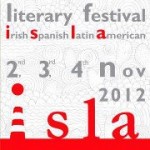 Ya solo quedan tres días para que de comienzo el esperado Festival ISLA de Literatura. Dentro de su programación, el sábado 3 de noviembre podremos disfrutar de un recital poético que dará comienzo a las tres y media de la tarde en nuestro Café Literario.
Ya solo quedan tres días para que de comienzo el esperado Festival ISLA de Literatura. Dentro de su programación, el sábado 3 de noviembre podremos disfrutar de un recital poético que dará comienzo a las tres y media de la tarde en nuestro Café Literario.
Elia Barceló, Kevin Barry, Christopher Domínguez Michael, Keith Ridway y María Negroni compartirán sus mejores textos con los asistentes al acto y unirán sus voces a este festival. La presentación, en este caso, correrá a cargo de Lorraine Kelly, de la Universidad de Galway (National University of Ireland). Pero, ¿quiénes son estos autores?, ¿no los conoces todavía?.
Elia Barceló (Alicante, España, 1957) ha publicado novelas policíacas, históricas, de ciencia ficción y género fantástico para adultos, así como novelas para jóvenes y ensayos. Ha sido traducida a diecisiete idiomas, entre ellos el inglés. Sus novelas traducidas al inglés hasta la fecha son: Corazón de tango (2007) (Heart of Tango, 2010) y El secreto del orfebre (2003) (The Goldsmith’s Secret, 2011).
Kevin Barry (Limerick). Su primer libro de relatos,There are Little Kingdoms, ganó el Premio Rooney de Literatura Irlandesa en 2007. Ha escrito sobre viajes y literatura para The Guardian, The Irish Times, The Sydney Morning Herald y muchas otras publicaciones. Su primera novela, City of Bohane (2011) ha sido galardonada en Reino Unido con el Authors’ club Best First Novel Award, que premia a la mejor primera novela del año.
Christopher Domínguez Michael (Ciudad de México, México, 1962), historiador y ensayista, es uno de los más conocidos críticos literarios hispanoamericanos. Es autor de numerosas publicaciones, siendo su última publicación Profetas del pasado. Quince voces sobre la historiografía de México (2011). Su Diccionario crítico de la literatura mexicana, 1955–2005 ha sido traducido y actualizado al inglés en 2012.
Keith Ridgway (Dublín, Irlanda, 1965). Su primera obra de ficción fue Horses (1997), a la que siguieronThe Long Falling (1998), Standard Time (2000); un libro de relatos, The Parts (2003); Animals (2006) yGoo Book (2011). Su última novela publicada esHawthorn & Child (2012). Ha recibido numerosos premios, entre ellos el Prix Femina Etranger y el Prix Premier Roman en París en 2001 por The Long Fallingbajo el título en francés Mauvais Pente, y el premio Rooney de literatura irlandesa en 2001. Las obras de Ridgway han sido traducidas a varios idiomas entre otros, el español.
María Negroni (Rosario, Argentina, 1951) es poeta, ensayista y novelista. Como poeta, ha publicado, entre otros libros: El viaje de la noche, Arte y Fuga,La Boca del Infierno y Cantar la nada. También ha publicado varios libros de ensayos y dos novelas. Su libro Islandia recibió el premio del PEN American Center en Nueva York al mejor libro de poesía en traducción del año (2001) y Galería Fantástica recibió el Premio Internacional de Ensayo de Siglo XXI (México). Su obra ha sido traducida al inglés, francés, sueco e italiano.
This event of ISLA Literary Festival will be an outstanding poetry reading in November 3rd at 3:30 at Café Literario.
Authors will read a selection of some of their best work in their original language in this poetry reading. Introduced by: Lorraine Kelly (NUI Galway).
Elia Barceló (Alicante, Spain, 1957) has published crime, historical, science fiction and fantastic novels for adults, as well as young adult books and essays. Her work has been translated into several languages, Spanish between others. Her novels translated into English are: Corazón de tango (2007), translated into English under the name Heart of Tango (2010) andThe Goldsmith’s Secret (2011), a translation of El secreto del orfebre (2003).
Kevin Barry was born in Limerick and now lives in Sligo. His first collection of short stories, There Are Little Kingdoms, won the Rooney Prize for Irish Literature in 2007. He has written about travel and literature for The Guardian, The Irish Times, The Sydney Morning Herald and many other publications. His debut novel City of Bohane (2011) recently won the Authors’ Club Best First Novel award in Britain.
Christopher Domínguez Michael (Mexico City, Mexico, 1962) is a historian and essayist, and also one of the most famous Hispanic-American literary critics. He is the author of several works, being his latest novel Profetas Del Pasado. Quince Voces Sobre La Historiografía De México was published in 2011. Since 2010 he has also worked as associate researcher at the Colegio de México. His workDiccionario Crítico de la Literatura Mexicana, 1955-2005 (Critical Dictionary of Mexican Literature, 1955–2010) has been translated into English and was updated in 2012.
María Negroni (Rosario, Argentina, 1951) is a poet, essayist and novelist. She has published numerous poetry books: Islandia, El viaje de la noche, Arte y Fuga, La Boca del infierno and Cantar la nada, to mention just a few. She has also published various essays collections and two novels. Her book Islandiareceived the 2001 PEN American Center Award for best book of poetry in translation. She was awarded the 21st Century International Essay Prize (Mexico) for her book Galería Fantástica. Her work has been translated into English, French, Swedish and Italian.
Keith Ridgway (Dublin, 1965). His first fictional prose Horses was published in 1997, followed by The Long Falling (1998), Standard Time (2000). A collection of short fiction, The Parts (2003), Animals(2006), Goo Book (2011) and Hawthorn & Child(2012). He has received numerous awards such as the Prix Femina Etranger and the Prix Premier Roman in Paris in 2001 for The Long Falling, under its French title of Mauvaise Pente, and The Rooney Prize For Irish Literature in 2001. His work has been translated into several languages and has been published in Spain, between other countries.
Mesa redonda: Cruzando fronteras: Poesía en la maleta | Round table discussion: Crossing frontiers: Poetry in the suitcase
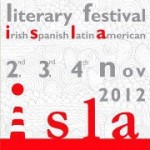 Le invitamos a una interesante discusión literaria que tendrá lugar el 3 de Noviembre a las 14:00, Festival Literario ISLA.
Le invitamos a una interesante discusión literaria que tendrá lugar el 3 de Noviembre a las 14:00, Festival Literario ISLA.
La poesía llega al festival ISLA con los autores Omar Pérez, Diego Valverde Villena, Máighréad Medbh y Lorna Shaughnessy. Cuatro formas de construir desde lo poético para enriquecer el panorama contemporáneo. Modera: Catherine O’Leary (NUI Maynooth)
Omar Pérez (La Habana, Cuba, 1964) es poeta, ensayista y traductor, además de periodista, crítico de teatro y cine, editor y locutor de radio. Su última publicación es la colección de ensayos El corazón mediterráneo (2011). Como poeta ha publicado Algo de lo sagrado (1996), ¿Oíste hablar del gato de pelea? (1999), Canciones y Letanías (2002) y Lingua Franca (2009). En inglés ha publicado Something of the Sacred (2007), traducción de Algo de lo sagrado, a cargo de Kristin Dykstra y Did you hear about the fighting cat? (2010).
Diego Valverde Villena (Lima, Perú, 1967). Poeta español y peruano, de ascendencia boliviana. En 2011 publicó su libro de poemas Un segundo de vacilación. Ha traducido obras de Conan Doyle, Kipling, John Donne, Ezra Pound, Valery Larbaud, Nuno Júdice, E.T.A. Hoffmann y Paul Celan, entre otros. Sus poemas aparecen en numerosas antologías y han sido traducidos a varios idiomas, entre ellos al irlandés. Entre sus principales obras de poesía se encuentran: El difícil ejercicio del olvido(1997), No olvides mi rostro (2001) y El espejo que lleva mi nombre escrito (2006).
Máighréad Medbh (Condado de Limerick, Irlanda) ha publicado cinco colecciones de poesía y un audiolibro. Fue pionera de la performance poética en Irlanda en los años 90. Su colección más reciente esTwelve Beds for the Dreamer (2010). Máighréad ha sido publicada en una gran variedad de antologías y ha escrito versiones de poemas gallegos para dos antologías recientes editadas por Manuela Palacios de la Universidad de Santiago de Compostela. Durante el festival, Máighréad presentará una mezcla de obras nuevas y algunas de Twelve Beds for the Dreamer y When the Air Inhales You.
Lorna Shaughnessy (Belfast, Irlanda del Norte, 1961) es poeta, traductora y profesora de Lengua Española en la Universidad Nacional de Irlanda, Galway. Ha publicado dos libros de poemas, Torching the Brown River (2009) y Witness Trees (2011) y dos traducciones de poesía contemporánea mexicana,Mother Tongue. Selected Poems by Pura López Colomé y If We Have Lost our Oldest Tales, de María Baranda (2006). Su traducción de The Disappearance of Snow de Manuel Rivas fue publicada en 2012.
You’re invited to an interesting literary discussion in November 3rd at 14:00, ISLA Literary Festival.
Poetry arrives at ISLA festival with authors Omar Pérez, Diego Valverde Villena, Máighréad Medbh and Lorna Shaughnessy. Four ways to build from poetry to enrich contemporary work. Chaired by Catherine O’Leary (NUI Maynooth).
(Havana, Cuba, 1964) is a poet, essayist and translator, as well as a journalist, theatre and film critic, editor and radio presenter. His last publication was the collection of essays El corazón mediterráneo (2011). As a poet he publishedAlgo de lo sagrado (1996), ¿Oíste hablar del gato de pelea? (1999), Canciones y Letanías (2002) andLingua Franca (2009). In English publishedSomething of the Sacred (2007), the translation ofAlgo de lo Sagrado by Kristin Dykstra, and Did You Hear About The Fighting Cat? (2010).
Diego Valverde Villena (Lima, Peru, 1967) is a Spanish and Peruvian poet of Bolivian descent. In 2011 he published his book of poems Un segundo de vacilación. He has translated, among others, works of Conan Doyle, Joseph Rudyard Kipling, John Donne, Ezra Pound, Valery Larbaud, Nuno Júdice, E.T.A. Hoffmann and Paul Celan. His poems appear in many compilations and have been translated into several languages, including Irish. His most famous works in poetry are El difícil ejercicio del olvido (1997), No olvides mi rostro (2001) and El espejo que lleva mi nombre escrito (2006).
Máighréad Medbh (Co. Limerick) has five published poetry collections and an audio CD. She was a pioneer of performance poetry in Ireland in the nineteen-nineties. Her most recent collection, Twelve Beds for the Dreamer was published in 2010. Máighréad has been published in a wide range of anthologies, and has written versions of Galician poems for two recent anthologies edited by Manuela Palacios of Universidade de Santiago de Compostela. During the festival, Máighréad will be presenting a mix of new work and some from Twelve Beds for the Dreamer and When the Air Inhales You.
Lorna Shaughnessy (Belfast, Northern Ireland, 1961) is a poet, translator and lecturer in Spanish in the National University of Ireland, Galway. She has published two collections of poems, Torching the Brown River (2009) and Witness Trees (2011) and two translations of contemporary Mexican poetry,Mother Tongue: Selected Poems by Pura López Colomé and If We Have Lost our Oldest Tales by María Baranda, (2006). Her translation of Manuel Rivas’ The Disappearance of Snow, was published in 2012.
Mesa Redonda: Escritores sin escrúpulos: Intimidad, violencia y humor en la literatura | Round table discussion: Writers without scruples: Intimacy, violence and humour in literature
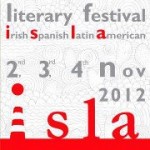 La primera actividad en el Festival Literario ISLA será una discusión literaria, que tendrá lugar el 3 de Noviembre a las 11:30 en el Café Literario.
La primera actividad en el Festival Literario ISLA será una discusión literaria, que tendrá lugar el 3 de Noviembre a las 11:30 en el Café Literario.
Temas como la identidad y la memoria, la violencia o el humor serán tratados por los invitados Ita Daly, Christopher Domínguez Michael, Rafael Gumucio y Catherine Dunne, con la moderación de Ciaran Cosgrove (Trinity College Dublin).
Ita Daly (Drumshanbo, Leitrim, Irlanda) ha publicado cinco novelas, una colección de cuentos y dos libros infantiles. Ha recibido el premio Hennessy Literary Award y el Irish Times Short Story Award. Su obra ha sido traducida al sueco, danés, japonés, italiano y alemán y sus relatos cortos han aparecido en revistas de Irlanda, Inglaterra y Estados Unidos. Uno de sus libros de relatos, The Lady With the Red Shoes, forma parte del plan de estudios de las escuelas de secundaria alemanas.
Christopher Domínguez Michael (Ciudad de México, México, 1962), historiador y ensayista, es uno de los más conocidos críticos literarios hispanoamericanos. Es autor de numerosas publicaciones, siendo su última publicación Profetas del pasado. Quince voces sobre la historiografía de México (2011). Es miembro del Sistema Nacional de Creadores de Arte desde 1993. Su Diccionario crítico de la literatura mexicana, 1955–2005 ha sido traducido y actualizado al inglés en 2012.
Rafael Gumucio (Santiago, Chile, 1970) ha trabajado como periodista en numerosos diarios nacionales chilenos, españoles y en el New York Times. En 1995 publicó el libro de relatos Invierno en la Torre y Memorias Prematuras. Ha publicado también las novelas Comedia Nupcial, Los Platos Rotos y Páginas Coloniales. Su última novela es La Deuda (2009). Actualmente es Director del Instituto de Estudios Humorísticos de la Universidad Diego Portales y co-conductor de Desde Zero en Radio Zero.
Catherine Dunne (Dublín, 1954), estudió inglés y español en Trinity College de Dublín. Su primera novela, In the Beginning, fue publicada en 1997. Le siguió A Name for Himself, finalista del premio Kerry Fiction Prize. Ha publicado otras seis novelas, The Walled Garden (2000), Another Kind of Life (2003), Something Like Love (2006), At a Time Like This(2007), Set in Stone (2009), Missing Julia (2011) y el ensayo An Unconsidered People: The Irish in Sixties London (2003). Sus novelas The Walled Garden (El jardín vallado) y A Name for Himself (Un nombre propio) han sido traducidas al español.
The first event in 3rd November of ISLA Literary Festival is a literary discussion, and it will take place at Café Literario at 11:30.
Topics such as identity and memory, violence or humour will be dealt with by guests Ita Daly, Christopher Domínguez Michael, Rafael Gumucio and Catherine Dunne, chaired by Ciaran Cosgrove (Trinity College Dublin).
Ita Daly (Drumshambo, Co. Leitrim) has published five novels, one collection of short stories and two books for children. She has won two Hennessy Literary Awards and an Irish Times Short Story Award. Her last novel, Unholy Ghosts (1997), was long listed for the International IMPAC Dublin Literary Award. Her work has been translated into Swedish, Danish, Japanese, Italian and German and her short stories have appeared in magazines in Ireland, England and America. Her short story collection The Lady With the Red Shoes (1980) is currently on the secondary school curriculum in Germany.
Christopher Domínguez Michael (Mexico City, Mexico, 1962) is a historian and essayist, and also one of the most famous Hispanic-American literary critics. He is the author of several works, being his latest novel Profetas Del Pasado. Quince Voces Sobre La Historiografía De México was published in 2011. He is a member of the Sistema Nacional de Creadores de Arte (National System for Art Creators) since 1993. His work Diccionario Crítico de la Literatura Mexicana, 1955-2005 (Critical Dictionary of Mexican Literature, 1955–2010) has been translated into English and was updated in 2012.
Rafael Gumucio (Santiago, Chile, 1970) has worked as a journalist for many Chilean and Spanish newspapers, as well as the New York Times. In 1995 he published the collection of short stories Invierno en la Torre and Memorias prematuras. He also published the novels Comedia Nupcial, Los Platos Rotos and Páginas Coloniales. His latest novel, La Deuda, was published in 2009. He now works as the director of the Institute for Humour Studies of the University Diego Portales and is co-conductor of Desde Zero at the radio station Zero. He received the Anna Seghers Award in Germany in 2002.
Catherine Dunne (Dublin, 1954). She studied English and Spanish at Trinity College, Dublin. Her first novel, In the Beginning, was published in 1997. A Name for Himself followed a year later, and was short listed for the Kerry Fiction Prize. She has published six further novels, The Walled Garden (2000),Another Kind of Life (2003), Something Like Love(2006), At a Time Like This (2007), Set in Stone(2009), Missing Julia (2011) and the non-fiction bookAn Unconsidered People: The Irish in Sixties London(2003). Her novels The Walled Garden (El jardín vallado) and A Name for Himself (Un nombre propio) have been translated into Spanish.
Hoy leemos con | Today we are reading with: Harry Clifton, Omar Pérez, Lorna Shaughnessy y Diego Valverde Villena
La segunda actividad del Festival ISLA es un estupendo recital poético que podrás disfrutar el 2 de noviembre a partir de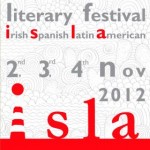 las 17:15 en el Café Literario.
las 17:15 en el Café Literario.
Estos cuatro poetas han seleccionado algunos de sus mejores poemas a los que pondrán su voz en este recital en versión original. Presenta: Bill Richardson (NUI Galway).
Harry Clifton (Dublín, 1952) ha vivido una parte importante de su vida fuera de Irlanda (Nigueria, Extremo Oriente, Italia…) De su estancia en Italia publicó sus memorias en prosa On the Spine of Italy. En 2004 regresó a Irlanda. Entre sus colecciones de poemas se encuentran The Desert Route: Selected Poems 1973-1988 y Secular Eden: Paris Notebooks 1994-2004. También es autor de una colección de ficción, Berkeley’s Telephone and Other Fictions(2000). Clifton fue nombrado Ireland Chair of Poetry en el 2010. Ha recibido también el premio de poesía Patrick Kavanagh y dos premios Arts Council Bursaries de literatura. Sus obras han sido traducidas a varias lenguas europeas.
Lorna Shaughnessy (Belfast, Irlanda del Norte, 1961) es poeta, traductora y profesora de Lengua Española en la Universidad Nacional de Irlanda, Galway. Ha publicado dos libros de poemas, Torching the Brown River (2009) y Witness Trees (2011) y dos traducciones de poesía contemporánea mexicana,Mother Tongue: Selected Poems by Pura López Colomé y If We Have Lost our Oldest Tales, de María Baranda (2006). Su traducción de The Disappearance of Snow de Manuel Rivas fue publicada en 2012.
Omar Pérez (La Habana, Cuba, 1964) es poeta, ensayista y traductor, además de periodista, crítico de teatro y cine, editor y locutor de radio. Su última publicación es la colección de ensayos El corazón mediterráneo (2011). Como poeta ha publicado Algo de lo sagrado (1996), ¿Oíste hablar del gato de pelea? (1999), Canciones y Letanías (2002) y Lingua Franca (2009). En inglés ha publicado Something of the Sacred (2007), traducción de Algo de lo sagrado, a cargo de Kristin Dykstra y Did you hear about the fighting cat? (2010).
Diego Valverde Villena (Lima, Perú, 1967). Poeta español y peruano, de ascendencia boliviana. En 2011 publicó su libro de poemas Un segundo de vacilación. Ha traducido obras de Conan Doyle, Kipling, John Donne, Ezra Pound, Valery Larbaud, Nuno Júdice, E.T.A. Hoffmann y Paul Celan, entre otros. Sus poemas aparecen en numerosas antologías y han sido traducidos a varios idiomas, entre ellos al irlandés. Entre sus principales obras de poesía se encuentran: El difícil ejercicio del olvido(1997), No olvides mi rostro (2001) y El espejo que lleva mi nombre escrito (2006).
The second event of the ISLA Festival will be an outstanding poetry reading on November 2nd at 5.15pm at Café Literario.
These four poets will be reading a selection of some of their best poems in their original language in this poetry reading. Introduced by Bill Richardson (NUI Galway)
Harry Clifton (Dublin, 1952) has spent great part of his life outside of Ireland (Nigeria, Far East, Italy…). He documented the time spent in Italy in his prose memoir On the Spine of Italy. In 2004, he returned to Ireland. His collections of poems include The Desert Route: Selected Poems 1973-1988 and Secular Eden: Paris Notebooks 1994-2004. He is also the author of a collection of fiction, Berkeley’s Telephone and Other Fictions (2000). He was appointed as the Ireland Chair of Poetry in 2010. His other honors include the Patrick Kavanagh Poetry Award and two Arts Council Bursaries in Literature. His work has been translated into several European languages.
Omar Pérez (Havana, Cuba, 1964) is a poet, essayist and translator, as well as a journalist, theatre and film critic, editor and radio announcer. His last publication was the collection of essays El corazón mediterráneo (2011). As a poet he publishedAlgo de lo sagrado (1996), ¿Oíste hablar del gato de pelea? (1999), Canciones y Letanías (2002) andLingua Franca (2009). In English he publishedSomething of the Sacred (2007), the translation ofAlgo de lo Sagrado by Kristin Dykstra, and Did You Hear About The Fighting Cat? (2010).
Lorna Shaughnessy (Belfast, Northern Ireland, 1961) is a poet, translator and lecturer in Spanish in the National University of Ireland, Galway. She has published two collections of poems, Torching the Brown River (2009) and Witness Trees (2011) and two translations of contemporary Mexican poetry,Mother Tongue: Selected Poems by Pura López Colomé and If We Have Lost our Oldest Tales by María Baranda, (2006). Her translation of Manuel Rivas’ The Disappearance of Snow, was published in 2012.
Diego Valverde Villena (Lima, Peru, 1967) is a Spanish and Peruvian poet of Bolivian descent. In 2011 he published his book of poems Un segundo de vacilación. He has translated, among others, works of Conan Doyle, Joseph Rudyard Kipling, John Donne, Ezra Pound, Valery Larbaud, Nuno Júdice, E.T.A. Hoffmann and Paul Celan. His poems appear in many compilations and have been translated into several languages, including Irish. His most famous works in poetry are El difícil ejercicio del olvido (1997), No olvides mi rostro (2001) and El espejo que lleva mi nombre escrito (2006).
Mesa redonda: Literatura fantástica y poesía. De Cortázar a Beckett, pasando por Borges | Round Table: Poetry and fantastic literature. From Cortázar to Beckett, including Borges along the way
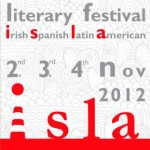 Abrimos el festival ISLA con esta mesa redonda en la que los invitados Elia Barceló, Harry Clifton y María Negroni hablarán sobre literatura fantástica y poesía, sus influencias y mucho más con Jean-Philippe Imbert (DCU). No te puedes perder esta cita el próximo día 2 de noviembre a las 16:00 horas en el Café Literario.
Abrimos el festival ISLA con esta mesa redonda en la que los invitados Elia Barceló, Harry Clifton y María Negroni hablarán sobre literatura fantástica y poesía, sus influencias y mucho más con Jean-Philippe Imbert (DCU). No te puedes perder esta cita el próximo día 2 de noviembre a las 16:00 horas en el Café Literario.
Elia Barceló (Alicante, España, 1957) ha publicado novelas policíacas, históricas, de ciencia ficción y género fantástico para adultos, así como novelas para jóvenes y ensayos. Ha recibido el Premio Gabriel 2007, galardón reservado para las más importantes personalidades del género fantástico en España. Ha sido traducida al francés, italiano, alemán, catalán, inglés, griego, húngaro, holandés, danés, noruego, sueco, croata, portugués, euskera, checo, ruso y esperanto. Sus novelas traducidas al inglés hasta la fecha son: Corazón de tango (2007), traducida al inglés como Heart of Tango (2010) y The Goldsmith’s Secret (2011), traducción de El secreto del orfebre (2003).
Harry Clifton (Dublín, 1952) ha vivido una parte importante de su vida fuera de Irlanda (Nigeria, Extremo Oriente, Italia…). De su estancia en Italia publicó sus memorias en prosa On the Spine of Italy. En 2004 regresó a Irlanda. Entre sus colecciones de poemas se encuentran The Desert Route: Selected Poems 1973-1988 y Secular Eden: Paris Notebooks 1994-2004. También es autor de una colección de ficción, Berkeley’s Telephone and Other Fictions(2000). Clifton fue nombrado Ireland Chair of Poetry en 2010. Ha recibido también el premio de poesía Patrick Kavanagh y dos premios Arts Council Bursaries de literatura. Sus obras han sido traducidas a varias lenguas europeas.
María Negroni (Rosario, Argentina, 1951) es poeta, ensayista y novelista. Como poeta, ha publicado, entre otros libros: Islandia, El viaje de la noche, Arte y Fuga, La Boca del Infierno y Cantar la nada. También ha publicado varios libros de ensayos y dos novelas. Ha traducido, entre otros, a Emily Dickinson, Louise Labé, Valentine Penrose, Georges Bataille, H.D., Charles Simic y Bernard Noël, y la antología de mujeres poetas norteamericanas La pasión del exilio(2007). Su libro Islandia recibió el premio del PEN American Center en Nueva York al mejor libro de poesía en traducción del año (2001) y Galería Fantástica recibió el Premio Internacional de Ensayo de Siglo XXI (México). Su obra ha sido traducida al inglés, francés, sueco e italiano.
The ISLA festival will kick off with this round table where guests Elia Barceló, Harry Clifton and María Negroni will discuss poetry and fantastic literature, its influences and much more with Jean-Philippe Imbert (DCU). This event will be held the 2nd of November at 4pm at our Café Literario.
Elia Barceló (Alicante, Spain, 1957) has published crime, historical, science fiction and fantastic novels for adults, as well as young adult books and essays. In 2007 she received the Gabriel Award, a prize for the most important personalities in the fantastic genre in Spain. Her work has been translated into French, Italian, German, Catalan, English, Greek, Hungarian, Dutch, Danish, Norwegian, Swedish, Croatian, Portuguese, Basque, Czech, Russian and Esperanto. Her novels translated into English are: Corazón de tango (2007), translated into English under the nameHeart of Tango (2010) and The Goldsmith’s Secret(2011), a translation of El secreto del orfebre (2003).
Harry Clifton (Dublin, 1952) has spent great part of his life outside of Ireland (Nigeria, Far East, Italy…). He documented the time spent in Italy in his prose memoir On the Spine of Italy. In 2004, he returned to Ireland. His collections of poems include The Desert Route: Selected Poems 1973-1988 and Secular Eden: Paris Notebooks 1994-2004. He is also the author of a collection of fiction, Berkeley’s Telephone and Other Fictions (2000). He was appointed as the Ireland Chair of Poetry in 2010. His other honors include the Patrick Kavanagh Poetry Award and two Arts Council Bursaries in Literature. His work has been translated into several European languages.
María Negroni (Rosario, Argentina, 1951) is a poet, essayist and novelist. She has published numerous poetry books: Islandia, El viaje de la noche, Arte y Fuga, La Boca del infierno and Cantar la nada, to mention just a few. She is also author of several essays and two novels. She has translated several poets: Emily Dickinson, Louise Labé, Valentine Penrose, Georges Bataille, H.D., Charles Simic and Bernard Noël, as well as the anthology of 20th century North American women poets La Pasión del Exilio (2007). Her book Islandia received the 2001 PEN American Center Award for best book of poetry in translation. She was awarded the 21st Century International Essay Prize (Mexico) for her bookGalería Fantástica. Her work has been translated into English, French, Swedish and Italian.
Interview with Ángel Guinda
Ángel Guinda: Being a Poet is Not a Profession, It’s a Possession
Interview with Ángel Guinda held on the 22nd October 2012 at the Dámaso Alonso Library of the Instituto Cervantes in Dublin in association with his participation in the literary reading “Useful poetry: commented reading”.
Ángel Guinda (Zaragoza, 1948) is best known for his poetry. In the early eighties, he published his collected poetry in Vida ávida, where the rawness of his words and a self-destructive nature stood out. In 1987, Ángel moved to Madrid, which gave way to a more existentialist style of poetry with titles likeConocimiento del medio, La llegada del mal tiempo and Biografía de la muerte. With the new Century, Guinda’s attempt to better communicate and connect with people, led to a more open and unified style of poetry. With Claro interior and Poemas para los demás, his work began to appeal to a wider audience. In 2010, he received the Premio de las Letras Aragonesas prize. Since then, he has published three poetry collections: Espectral (2011) Caja de lava (2012) andRigor Vitae (2013).
Carmen Sanjulián: —Ángel, you’ve been writing for many years. Do you remember your first poem?
Ángel Guinda: —I think my first poem was a ballad, when I was 12, to celebrate (I’m almost embarrassed to mention it) my stepsister’s First Communion.
Carmen Sanjulián: —Embarrased? Why?
Ángel Guinda: —Well, because of the way life has changed… They say, “If you’ve lived, you’ve seen it all”. When I was young, I was an altar boy, I had to study Greek and Latin. I went to mass and was Christian, Catholic, Apostolic and Roman, until I reached 30, which is when I lost my faith.
Carmen Sanjulián: —Things have changed a lot. You not only write poems, but also theorise about poetry and the role of the poet in society, which lead yout to publish poetic manifestos such as Poesía y subversión, Poesía útil, Poesía violenta, o El mundo del poeta. El poeta en el mundo. Why do you have this need to write, to reflect?
Ángel Guinda: —That´s a really interesting question. I began to theorise about poetry when I already had my own poetic style. I already knew where I wanted to go and roughly what voice I wanted to project. Then I started to ask myself the big questions, “What is the word?” I thought the word was about being alive, so I answered myself, “The word is a living thing”. I was self-evident and I explained this to my students. “What is a poet?” I argued, “Being a poet is not a profession, its a possession”. “What is a poem?” “What is poetry? I mean, I started to ask myself the fundamental questions in order to reaffirm my style and my own voice.
Carmen Sanjulián: —You wrote one of your manifestos at the Casa del Poeta in Trasmoz. You where the first guest and you began with a hunger strike. Has anything changed since then?
Ángel Guinda: —Very little, unfortunately. I remember that among the literary claims there was one in Euskadi that vindicated the poetry and the great Basque poets who hardly wrote anything in Basque, but in Spanish, like Blas de Otero or Gabriel Celaya – poets who did so much for the advent of freedom in Spain.
When I attended a tribute to Celaya, in the village where he was born, his widow, Amparo Gastón, was there, and I witnessed tomatoes being thrown at them, at the widows of Blas de Otero, Sabina de la Cruz… I crumbled. It seemed a terrible injustice to me. Apparently now there is more respect for the poetry of Gabriel Celaya and Blas de Otero, especially after the truce was called.
I also pushed, for example, for the opening of a Poet’s House in each of the autonomous communities of Spain, there´s still only one in Trasmoz, as the only centre for literary translation is in Tarazona. On top of this, I called for 0% VAT on literature. Although almost nothing has been achieved since then, it had some impact at the time and I felt great support from my literary colleagues and readers in general.
Carmen Sanjulián: —Paradox is a distinguishing element in your poetry, but it´s also an element that distinguishes you in life.
Ángel Guinda:—Yes, because as Cernuda said “It is not love that dies, but we ourselves”… I am eternally in love with life and I believe in the immortality of love but then I admit that I married four times. This is an example of paradox in my life, but there are many more…
Carmen Sanjulián: — Poets have been described as being cursed, is there such a thing as a poet who is blessed?
Ángel Guinda: —I think I´m blessed. Even though Ángel Crespo coined the term “Ángel Guinda, cursed poet” in a study about.my poetry. As a poet, I´m blessed.
Carmen Sanjulián: —How come?
Ángel Guinda: —Because I think I’m a good person. I want to be, and I think I am, a good guy. If we interpret being cursed as voluntarily choosing to be on the fringes of society, with little power and influence, then I am
Carmen Sanjulián: —You defend the idea of poetry as something useful. In what way has poetry helped you?
Ángel Guinda: —It has helped me in a lot of ways. It has helped me as a means of expression. For me, expressing yourself is part of being alive. When you have more and better ways of expressing yourself, you feel more alive.
I use poetry as a means of expression, of communication, of understanding and a way of looking at the world. Not only in terms of aesthetics but also in the way I face the world with a resilient attitude. Life is marvellous, that´s true, but life is very hard for everyone, it´s really challenging and feeling positive can be the contradiction to death.
Carmen Sanjulián: —This is one of the topics that you regularly visit.
Ángel Guinda: —Sure – life, death, the passing of time that erodes everything…
Carmen Sanjulián: —So you´re saying that poetry is useful. A few days ago I read that they´re thinking of making economics a compulsory subject in schools. Do you think they´ll ever make poetry compulsory?
Ángel Guinda: No, I don´t, unfortunately. It has nothing to do with looking out for our own interests, but unfortunately, no. I have given language and literature classes in secondary school and have tried to make my syllabus live up to the generation of 1936, which has helped me develop effective teaching tools to capture the students attention and try to motivate them. These include using song lyrics, including rap (students really like this), using the class as a translation workshop, using audiovisual aids…
Poetry is really interesting because it´s a cultural medium, like art or music, but it requires attention, dedication and a special method of teaching so that students, and especially adolescents, become interested in it.
Carmen Sanjulián: — You´ve had a lot of success with your students though. David Francisco, a student of yours, directed the film «La diferencia», based on your life. He mentioned in an interview that students regularly requested you, as you had a way of opening up their eyes to the world.
Ángel Guinda: —It´s funny you mention that because three years before my retirement, I thought that nobody knew I was a poet.But then they began to check my books out of the library and soon they were discovered by the media.
Carmen Sanjulián: —In Entrevista a mí mismo, a documentary also made by David Francisco, we see Ángel Guinda bare all. Was it difficult for you?
Ángel Guinda: —No it was quite easy actually, because I had a poem called “Entrevista a mí mismo” and I had the idea to develop different characters, so I dressed up as a journalist, and afterwards a poet, to become myself. It was very interesting.
Carmen Sanjulián: —Do you distance yourself from labels or do you have any hidden weaknesses?
Ángel Guinda: — Poetically speaking, I´ve always stood out. When I was younger and used childish language, people said that I always did my own thing. The critics said it…Manuel Rico also mentioned it when he reviewed Caja de lava.
I’ve always been a poet who did my own thing and haven´t given into trends. Think of my very dear and admired colleague´s so-called “poesía de la experiencia” or “poesía de la diferencia”, or “decadent aestheticism“…
But it’s true that for many years I admired two great poets of my generation – Pere Gimferrer and Leopoldo María Panero, until about ten years ago.
Carmen Sanjulián: —Has anything changes since you received the “Las Letras Aragonesas” award in 2010?
Ángel Guinda: —Yes, there has certainly been some changes. After leaving Aragon 23 years earlier, I was surprised to receive such an honour from my people in 2010. At first I was surprised, but then I felt honoured. I promised not to let them down, resolving to remain honest and demanding more from myself, in order to get the most out of this constant learning experience that is poetry. The apprenticeship where I learned my craft was with the great Catalan poet Salvador Espriu.
Carmen Sanjulián: —You wrote a poem about Lavapiés, the neighbourhood where you live, amongst other things. When you look for an image of Ángel Guinda, it´s almost impossible to find a picture of you without a cigarette in your hand. Have you ever written a poem about your constant companion?
Ángel Guinda: —Twenty years ago I wrote a poem I know by heart, unfortunately, and it goes like this:
I have smoked life
as time has smoked me.
Look at this larynx, this trachea,
these bronchi and lungs
gunned down by nicotine.
I have smoked the underground fumes
of the subway, of its platforms;
Madrid air, dirty,
like a betrayal of the most beautiful light;
…
And speaking of smoke…my latest project, Rigor vitae, which I´ve been working on compulsively for the last six months, features numerous crosses, a lot of smoke and countless shadows. Of course, smoke symbolises many things. Smoke prevents us from seeing the reality around us.
Carmen Sanjulián: —Is your latest project closer to Espectral or Caja de lava?
Ángel Guinda: —Espectral. People surprised me a lot by saying it was the best book I had written. The truth is that it was written in a state of euphoria, in a trance for nine months. It´s a book that amasses all a poet’s obsessions – with authenticity and with all his inner demons. The ghost of the mother who dies bleeding in childbirth, the ghost of infertility and not being able to have children, etc… But I’ve come to realise that the reality around me is more haunting than the phantom of a work of poetry. So much to say that my writing opposes reality and this is not what it´s about.
Rigor vitae is closer to Espectral than the figurative poetry of Caja de lava .
Carmen Sanjulián: —I went to the launch of Caja de lava. So many comments were made about the title!
Ángel Guinda: —It has a very interesting story, at least for me, personally. When the book was in the works, it was called Caja débil (Fragile Box). But I’m a hypochondriac. Although I have the self-destructive instinct to smoke, I also have a fear of death. So I began to wonder if “fragile box” was really a metaphor for the rib cage, because this was so bad. So I tried to revitalise myself a little bit, inject more fire, more energy into my work, and so the title became Caja de lava (Box of Lava).
Recommended links
- [Vídeo] Interview with Ángel Guinda at the Instituto Cervantes in Dublin by Carmen Sanjulián.
- Ángel Guinda Official Website.
- Interview with Ángel Guinda in Poesía para todos.
< List of interviews
Recital literario: Poesía útil con Ángel Guinda | Poetry reading: Useful Poetry with Ángel Guinda
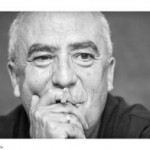 El Instituto Cervantes de Dublín y la editorial Olifante tienen el placer de presentarles hoy a las 18:00 en el Café Literario este recital poético del autor español Ángel Guinda, quién mostrará una proyección de videoclips sobre su poética (Arquitextura) y Manifiestos (Poesía útil, Antimanifiesto, Manifiesto No) además de videopoemas. A los audiovisuales les seguirá una lectura comentada por el propio autor y un coloquio. Presenta y conversa con el autor, Jennifer Wood (NUI Maynooth)
El Instituto Cervantes de Dublín y la editorial Olifante tienen el placer de presentarles hoy a las 18:00 en el Café Literario este recital poético del autor español Ángel Guinda, quién mostrará una proyección de videoclips sobre su poética (Arquitextura) y Manifiestos (Poesía útil, Antimanifiesto, Manifiesto No) además de videopoemas. A los audiovisuales les seguirá una lectura comentada por el propio autor y un coloquio. Presenta y conversa con el autor, Jennifer Wood (NUI Maynooth)
Ángel Guinda (Zaragoza, 26 de agosto de 1948) es un escritor español conocido sobre todo por su poesía, aunque su obra abarca géneros muy variados: artículos en periódicos y revistas, ensayos y traducciones. Fundó la Colección Puyal de libros de poesía en 1977 y la revista Malvís en 1988. Ha publicado más de una veintena de libros y es coautor de la letra del Himno de Aragón. En 2010 fue galardonado con el Premio de las Letras Aragonesas.
Ángel Guinda dará una charla en la Universidad de Maynooth el martes 23 de octubre a las 17:00 h.
Instituto Cervantes Dublin and Olifante Publishing House are delighted to present this poetry recital today at 6pm at Café Literario by Spanish author Ángel Guinda. He will screen a series of video clips about his poetry (“Arquitextura”) and Manifestos (“Poesía útil”, “Antimanifiesto”, “Manifiesto No”) as well as video poems. The videos will be followed by a recital with comments by the author and a Q&A session. Introuced by Jennifer Wood (NUI Maytnooth)
Ángel Guinda (Zaragoza, August 26th, 1948) is a Spanish writer known mainly for his poetry, although his work extends to various genres: newspaper and magazine articles, essays and translations. He founded the Colección Puyal of poetry books in 1977 and the Malvís magazine in 1988. He has published over twenty books and is the co-author of the lyrics to the Aragón anthem. In 2010 he received the award Premio de Letras Aragonesas.
Ángel Guinda will offer a lecture at the University of Maynooth in October 23rd, at 5 pm.
Festival Literario ISLA / ISLA Literary Festival
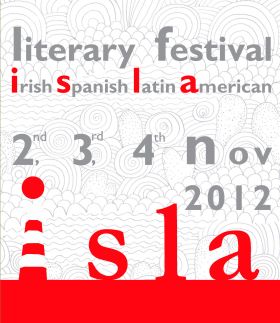 Irlanda es una isla grande y fértil. Una isla sembrada de escritores y de buena literatura. Un escritor, en algún momento de su labor creativa, también ha de convertirse en una isla, retirarse en silencio hasta el lugar en donde se encuentran las palabras, esas mismas palabras que luego descubrirá algún lector solitario, como un tesoro en una isla pirata, un tesoro en forma de libro.
Irlanda es una isla grande y fértil. Una isla sembrada de escritores y de buena literatura. Un escritor, en algún momento de su labor creativa, también ha de convertirse en una isla, retirarse en silencio hasta el lugar en donde se encuentran las palabras, esas mismas palabras que luego descubrirá algún lector solitario, como un tesoro en una isla pirata, un tesoro en forma de libro.
Un buen libro es una isla que contiene el universo.
ISLA es también el nombre que hemos querido dar a nuestro festival de literatura. Es el acrónimo de “Irish, Spanish and Latin American” Literary Festival. Es por tanto, también, una ISLA grande, fértil y multicultural en la que estamos todos unidos, irlandeses, latinoamericanos y españoles, por primera vez, en torno a la literatura.
Nunca antes se había celebrado un festival de estas características. Sin embargo, creemos que hacía ya mucho tiempo que venía siendo necesario. Hoy, gracias al entusiasmo demostrado tanto por Dublin UNESCO City of Literature, Ireland Literature Exchange, Poetry Ireland y el apoyo de las universidades Dublin City University, NUI Galway, NUI Maynooth y Trinity College Dublin, como por las embajadas de Argentina, Chile, Cuba, México y por supuesto por la Embajada de España, de la que el Instituto Cervantes forma parte, este festival es una realidad. Solo podemos tener palabras de agradecimiento para todos ellos.
Y aquí estamos todos, unidos en este proyecto. Comprometidos, comunicados, reunidos en este hermoso territorio común en el que hemos depositado tantas ilusiones.
No tiene sentido que algunas de las literaturas más fecundas del planeta sigan viviendo de espaldas entre sí. Es necesario que del intercambio de experiencias e ideas, de un mejor conocimiento entre unos y otros surjan nuevas traducciones, nuevos libros y, sobre todo, nuevos lectores.
Bienvenidos a nuestra ISLA.
Ireland is a great and fertile Island. It is an Island cultivated with writers and high quality literature. A writer during the course of his creative work must also become an island, withdrawing in silence to a place where words are kept. Those same words which some solitary reader will discover like hidden treasure on a pirate island, treasure in the form of a book.
A good book is a universe within an island.
The Spanish for ‘island’ is ‘ISLA’. It is the name we have chosen for our Literary Festival. It is the acronym for ‘Irish, Spanish and Latin American’ Literary Festival. It is also in that way a great, fertile and multicultural island where the Irish, Latin Americans and Spanish for the first time are all united and gathered around literature.
Never before has such a festival taken place. However, we believe it to be a much needed, unique event that has been a long time coming. Today, and thanks to the enthusiasm of Dublin UNESCO City of Literature, Ireland Literature Exchange, Poetry Ireland and the support of Dublin City University, Trinity College Dublin, NUI Galway, NUI Maynooth, the Embassies of Argentina, Mexico, Chile and Cuba, and by the Spanish Embassy, of which Instituto Cervantes is a part, this Festival is now a reality. We can only offer words of sincere gratitude to all of them.
We are all here, united in this project. Committed, connected and gathered together in this beautiful shared place where we have invested so many dreams.
It does not make sense that some of the most fertile literary figures on the planet should live in disregard for one another. It is imperative that from the exchange of experiences and ideas and from a better understanding between one another, new translations, new literature and, above all, new readers should emerge.
We wish you a warm welcome to our ‘island’ ISLA.
